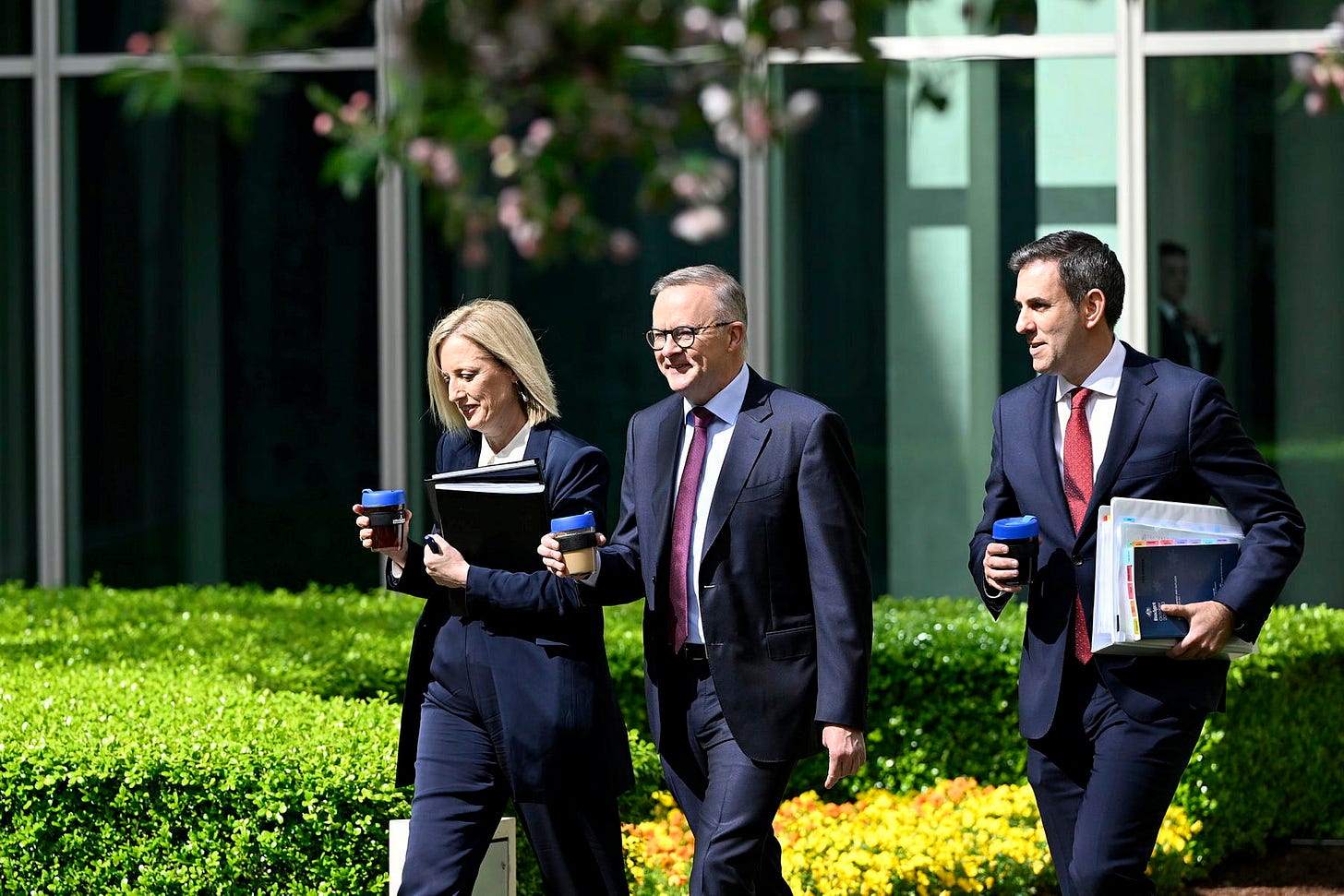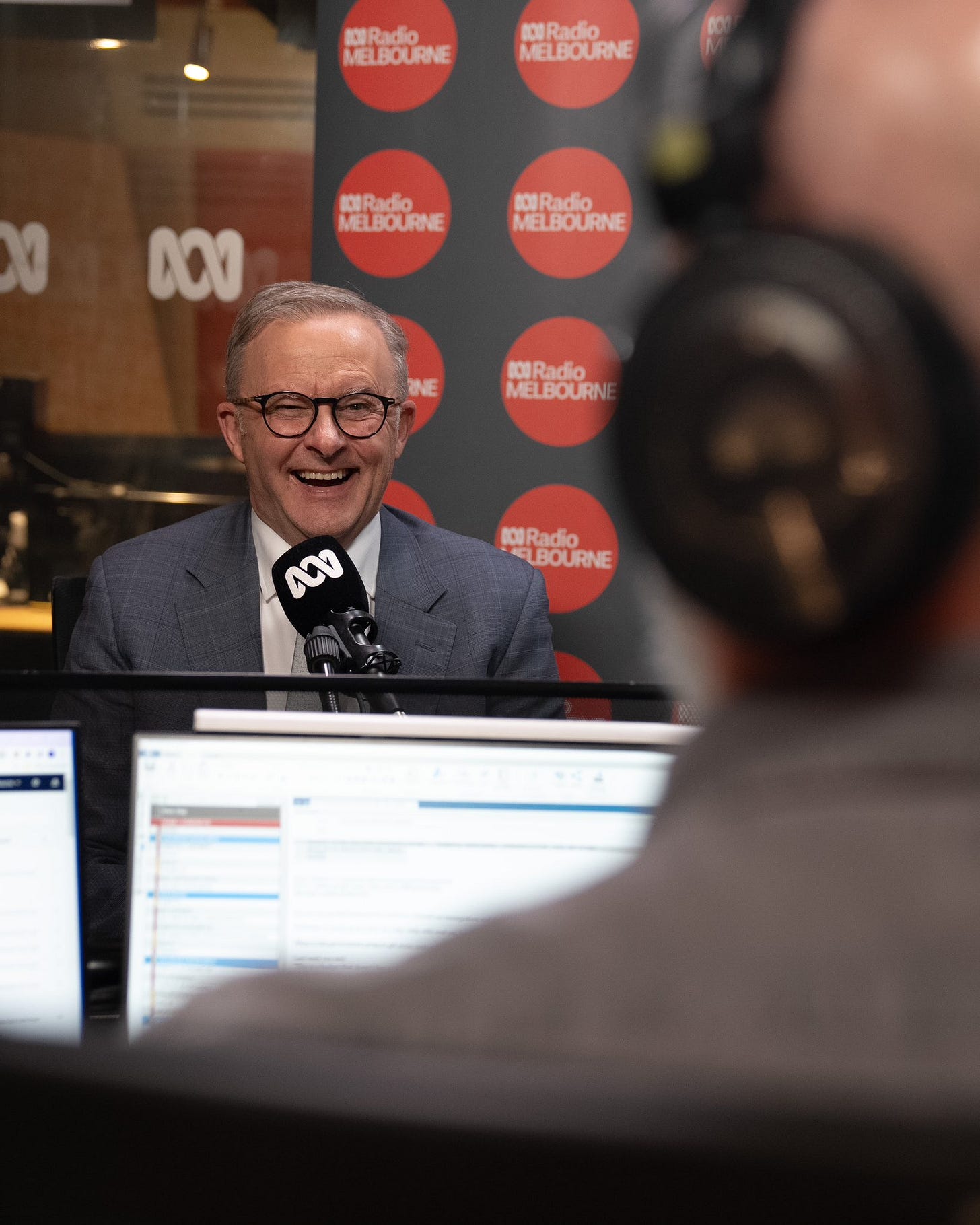Two dollars eighty-five and a surplus of anger
The government may have a budget surplus but it doesn’t do anything to address the surplus anger sitting in the public over its underwhelming response.

In the afterglow of last weeks budget, just as the news arrived that Westpac had snagged $4bl quarterly profits along with the other corporate giants in this totally-not-a-profit-price-spiral, the government looked to sell its economic message. As Tanya Plibersek signed off on her first shiny new coal field, Anthony Albanese was doing the rounds in Victoria, telling Australians what was in the budget for them on local radio. While the PM got around to meeting with constituents to explain to them how the surplus budget “delivers for Australians”, he did so in the Brighton end of Josh Burns’ constituency, choosing to appear before a wealthy voting class in Macnamara instead of venturing out a bit further into places like Scullin and McEwen, where the cost of living crisis is shredding those who live dangling on either side of the Henderson poverty line.
But there would be no sweeping reform, no repealing of the $253 billion tax cuts for the rich, nor any changes to negative gearing from the party who channelled the benevolence of Whitlam in its historic election victory. In the lead up before the favourable forecast had come in, initially Katy Gallagher, Jim Chalmers and senior MPs were talking tough on the fact that there would be no relief for the hundreds of thousands living on less than fifty dollars a day. In response to the fallout, Labor floated an increase to Jobseeker recipients for over-fifty-fives exclusively, and realising that the last minute windfall that splashed in from commodities would produce an unanticipated surplus, light on reform and heavy on Band-Aids and can-kicking, in the shadow of half-a-trillion dollars’ worth of exotic imaginary submarines and an unprecedented housing crisis involving negative gearing assisted rapacious landlords pricing low income families out of their homes, Labor chose to bestow a milk-carton increase of $2.85 per day for the nation’s poorest people at the eleventh hour.
Angus Taylor said a “drover’s dog” could get a surplus in this budget – an interesting point from someone in the doghouse of opposition – calling the allocated spending inflationary. Some in the government some thought it was one of the best things ever as they all played back-slapping dress-ups with a toy $4 billion surplus amidst a in a once in a generational crisis, while sitting on a chest holding $253 billion dollars of locked-up relief. It’s jarring to hear them so readily recounting neoliberal talking points more akin to those of Tony Blair’s New Labor, instead of signalling the inspirational intentions of a bold and sweeping reformist party of the left, that bravely indicates it is willing to stand tall to reenergise the nation and revitalise democracy.
The government spoke proudly how it rolled back a single parent payment, adjusted under a previous Labor iteration that damaged a generation. Chalmers talked about the aged care workers and the minimum wage bump and the cheaper childcare, but his government leaves the broken circuitry in place that drives corporate profits, and those corporations run unhindered into record earnings and price gouging activity under inadequately regulated quagmires, whilst the Reserve Bank shifts the needle upwards (when not needed) on interest rates as a cudgel to bash inflation onto the heads of the lower-middle class. Energy bill relief, productivity commission-inspired childcare assistance and tweaks to Commonwealth rent assistance don’t cut it, and nor does $2.85 -- not when corporate buybacks and extreme year-on year shareholder profits are so starkly contrasted against the extreme poverty creeping into this country’s mainstream.
This compounding nationwide poverty can no longer be swept away as it seeps through the surface of everyday life, exemplified by the homeless living on cardboard boxes out the front of duopoly chain supermarkets, and single mothers bursting into tears on nationally televised panel programs.The muscle memory remains from the commission housing loans in the Menzies era, free education and healthcare under Whitlam and Hawke, and superannuation under Keating, and Australians carry an inter-generational memory of living in a land that has striven to ensure that is citizens are rewarded with ‘wealth for toil’. In the wake of Labors budget, this Australian public sits numb, with everyone keenly aware of someone doing it tough due to the economic status quo now inscribed into both sides of the major political coin, and offended at what is being put together by this expansively underwhelming and seemingly oblivious political enterprise.
It’s important to keep talking about this budget, about all it failed to inspire, to highlight all the dreams it lacked and the party who conjured them, because it was the only alternative offered by a political movement that secured more votes from people that care about the cost-of-living issues they campaigned on than it may think to believe. The government might look to fly off with the press to talk about lifting military budgets, opening new coal fields, and building stadiums next to tent villages, but the issue everyone is calling up on the talk-back programs about, getting on social media and venting about, and crying in the grocery aisle at the supermarket about, are the drastic impacts of cost of living, inflation and housing, and not about the need to prepare for a theoretical war with our largest economic partner. Why is this clear and sound message not getting through to a ‘progressive’ Labor Government?
The profit-driven keep saying that they are expecting harder times ahead while they roll in unprecedented and obscene acquisition of wealth, sitting in gilded echo chambers, speaking at the shareholder class with their backs to the crowd, told from behind that everything is going to be alright by the major party champions that preserve this nightmare while playing a pantomime with the peoples concerns: a Terra Nullius major strategy towards the poor that preserves the elite who perpetuate the norms buffeting the greed-profit inflation spiral bearing down on Australians. The current conditions persist due to this government’s unwillingness to break the cobwebs strewn throughout the economic conventions constructed over ten years of dire Coalition policy that is geared to serve the wealthiest, to the demise of the poorest, at the expense of the evaporating middle class that define the quality of life in this country.
Australians are languishing after a decade suffering under a Coalition government that tore at the fragile safety nets that sustain our way of life. After it weakened the regulatory bodies and cultivated a ruthless political culture in Canberra, Australians were hoping for a bold Labor government undeterred to make changes and reforms with the backing of most of the people -- but it couldn’t even budge on a few extra billion for housing, nor remove the notorious stage three tax cuts, let alone whisper about the generational chasm of negative gearing and capital gains taxes. A budget that taxes student loans more than gas companies is a sure way to make it be known that there won’t be many big ideas from this government, and no more relief than $2.85 for the most downtrodden. As the nation slides further into a multitude of economic omnicrises, Labor has abandoned a golden opportunity to make the tough reforms that are needed to bring back fairness, squandering it to play politics in a dead end move to the centre-right.
Labor narrowly avoided a minority government in a rising tide of teal, and its reticence to make budget reforms ignores the fact it wasn’t put there to govern in its predecessor’s shadow. They should know better than to dismiss this expectation. The government may have a budget surplus but it doesn’t do anything to address the surplus anger sitting in the public over its underwhelming response. Its second budget is small target just like itssmall target election campaign, and some small target thinkers within the bubble may well think that’s a sound strategy. But right now, as things go south for millions while profits go up for some, the government is on the clock, and its ‘responsible budget’ isn’t necessarily a beneficial budget for the millions of marginalised people that granted them the chance to govern. Labor may yet find just how easily that chance gets taken back.



Again, an exceptional piece and like you Joel, I am incandescent with rage. Unlike so many Australians, 'little' Anthony grew up benefitting from the stabilty of being housed in a property, (for the record, NOT Housing Commission high rise), where his grandfather was the FIRST tenant, heading up what became a 'dynasty' of three generations. Unlike myself and so many others, he wasn't compelled to move to follow work or more tenable rent and he didn't get his mitts grubby with ANY form of labour. There is a food bank at the end of my street and a family of three living in a car, next to the milkbar. All in HIS electorate. Why no public outcry? Normalcy bias? Shares in Woodside, Woolies and the banks? Be buggered if I know, but it seems like too many Aussies have succumbed to the 'I'm alright Jack', mantra losing no sleep over turning their backs on 'those without'. They seem to forget that, sooner or later, one way or the other, their turn will come. Know how much I appreciate your work at this most awful time for so many in this country.